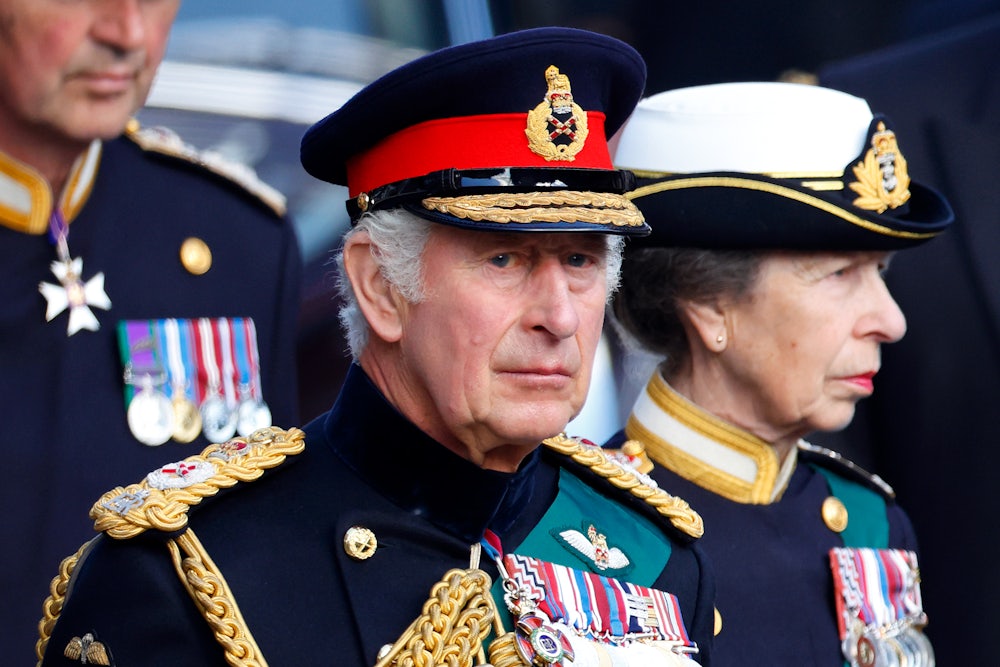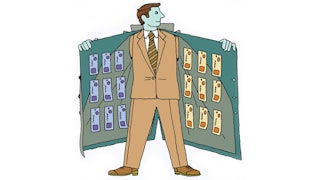In George Bernard Shaw’s 1928 play The Apple Cart, a satire set in an indeterminate future, a British prime minster and his Cabinet blackmail the king into giving up the crown’s remaining prerogatives. The king consents, then upsets the titular apple cart by saying he will abdicate and stand for Parliament. The elected officials immediately recognize that as ex-monarch he can capitalize on his popularity to become prime minister and turn them all out of office. So they back down, leaving the monarchy’s powers unmolested.
Shaw was no monarchist—he declined a royal order of merit—but neither did he care much for democracy. “The people cannot govern,” Shaw wrote in his preface to The Apple Cart. “Every citizen cannot be a ruler any more than every boy can be an engine driver or a pirate king.” To dramatize this point, in The Apple Cart Shaw’s prime minister and Cabinet are controlled by a mammoth corporation called Breakages Limited, leaving government entirely in the hands of plutocrats.
It doesn’t pay to take Shaw’s politics at this late stage of his life too seriously. The Fabian socialist was 72 and nursing an ill-considered admiration for Benito Mussolini (who did not, it can’t be repeated enough, make Italian trains run on time). Still, it’s fun to speculate how Shaw, who died in 1950, might have reacted to the evident reality that the British monarchy has itself become a mammoth corporation, or at least a decently sized one, and that King Charles III is a sort of cartoon rentier capitalist. At last, an explanation for this king-and-queen business that we Yanks can understand.
Please bear with me as I show you an equation. There’s a good chance you’ve seen it before. The British royal family is a superb petri dish in which to test the French economist Thomas Piketty’s hypothesis that
r > g
where r is the return on capital and g is the rate of economic growth.
That is a matter of great interest here in the United States, where the Baby Boom generation (of whom the new king is a member) will leave behind an estimated $68 trillion in wealth even as taxation and other limits on wealth inheritance wither away. (See my December 24 piece, “Defund the Dead.”) Piketty warns that the U.S., France, the United Kingdom, and any number of other advanced economies may be returning to the “patrimonial capitalism” that prevailed before the twentieth century. In that sense the British monarchy, which for a century has been understood to be an anachronism, must now be recognized as way ahead of the curve. Nothing is more patrimonial than a royal line of succession.
The vital question surrounding r > g is whether a third variable, invisible to economists but familiar to anybody who reads the tabloids, will reduce r sufficiently to render the formula incorrect. That variable is dissipation (d). Allow me to revise Piketty’s hypothesis:
r-d > g
where r is the return on capital; d is how much of that capital gets pissed away through taxation, procreation, and reckless living; and g represents the rate of economic growth. In effect, compounding interest (historically low for the past decade but lately headed upward) must outrun the costs of taxation (declining globally), procreation (declining in wealthier countries), and the loafing and degeneracy that attend the inheritance of great fortunes.
In the case of the royal family, taxation is at worst a minor concern. Writing in The Washington Post, Adam Taylor explains that although the British government usually collects a not-inconsiderable 40 percent on inheritances exceeding $380,000, Charles won’t pay a cent because he’s exempted. However much of the queen’s roughly $500 million in personal assets is bequeathed to Charles will not be taxed. However much of the queen’s assets pass to Charles’s siblings and to his and their children, who run the spectrum from mild indolence to possibly illegal degeneracy, will be taxed. The great majority of the $500 million, presumably, will go directly to Charles. That imposes a useful limit to how much of the royal fortune can be burned through by riding on horseback, hosting Grand Knockout tournaments, dressing up as a Nazi, or allegedly sexually abusing underage girls.
The royals are of course worth a hell of a lot more than $500 million. Forbes put their collective worth at $28 billion. But much of that is controlled by the British government and therefore more like a jumbo-size expense account. An exception is the $950 million Duchy (i.e., dukedom) of Lancaster, which Charles inherited from his mother. The Duchy of Lancaster, which dates to 1362, could be a poster child for r > g. It passes from sovereign to sovereign, bypassing both taxes and royal wastrels (though the queen gave much of the proceeds to her children).
A New York Times story by Jane Bradley and Euan Ward that was also posted Tuesday trained its sights on the Duchy of Cornwall, in Charles’s possession for the past half-century and now transferred to Prince William because it always passes from one royal heir apparent to the next. The Duchy of Cornwall, which dates to 1337, is valued at about $1.4 billion, an even bigger pile of cash than the Duchy of Lancaster’s. Royal heirs apparent are riskier as conservators than monarchs because they incline toward loafing and degeneracy. (See Shakespeare’s Henry IV, parts one and two). But Prince Charles, his Tampax fetish notwithstanding, was no Prince Hal. He husbanded his wealth with alacrity. The Duchy’s financial performance, lackluster when Charles inherited it, is now shipshape, according to the Times. Score another victory for r > g.
Part of the secret to making the return on capital outrun taxes and dissipation is to invest whenever you can in offshore tax havens. The 2017 Paradise Papers revealed that the Duchy of Lancaster, while in the queen’s possession, invested millions of pounds in the Cayman Islands and that the Duchy of Cornwall, while in Prince Charles’s possession, invested millions of pounds in Bermuda and other offshore tax havens. In both instances, Buckingham Palace insisted that the royals enjoyed no tax benefit from the arrangement, which I find hard to believe. (In the case of the queen’s investment in the Caymans, The Guardian explained the scheme was arranged to avoid U.S. taxes, so perhaps the palace spokespeople meant the royals got no British tax benefit from the arrangement.)
As a form of government, the British monarchy is a ridiculous anachronism. But as a form of capitalism, it’s the cutting edge. Much like the economies of the U.S. and Britain, the crown accumulates wealth the same way it governs—by not doing anything. In the great sweep of history, this is new. Back in medieval times, whenever an English king felt a little short on cash, he’d start a war (usually in France) and fatten his purse through taxes and theft. When the Industrial Revolution came along, England and later America accumulated wealth by manufacturing goods. That sort of vigorous activity is no longer how you get rich.
Today finance, insurance, and real estate represent about 20 percent of gross domestic product in the U.S. and roughly the same in the U.K. That’s about twice their relative size when Elizabeth became queen in 1952. The central activity in finance, insurance, and real estate is waiting around for capital to accumulate (or trading to make it accumulate faster). To a remarkable extent, that’s what today’s economy is: sitting at your desk (or throne) and watching your capital grow. Even during what may be a recession, with compensation costs rising at a pretty brisk annual rate of 5.1 percent, corporate profits are rising faster. Capital’s share of national income is going up, labor’s share is going down, and last year the median price increase in houses exceeded median income. Working for a paycheck? Don’t be a sucker. Ours is now a rentier economy. King Charles III and his mother pioneered it by being, respectively, a constitutional monarch with no power and a constitutional monarch-in-waiting with even less power. They just watched their royal fortune grow. Now that’s what all capitalists do. Only the commoners get left out.










